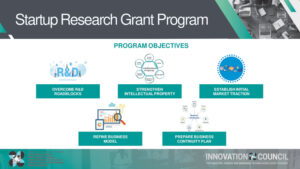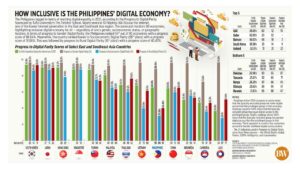DoST PCIEERD helps Philippine startups to succeed and expand

By Adrian Paul B. Conoza, Special Features Assistant Editor
Driven by the Innovative Startup Act of 2019, the Philippine Council for Industry, Energy, and Emerging Technology Research and Development (PCIEERD) under the Department of Science and Technology (DoST) has been bringing a much-needed boost to the Philippine startup ecosystem. While its programs and incubators have been running for around two years, however, the council still seeks to support startups that offer fresh solutions to the market.
PCIEERD, one of the three sectoral planning councils of DoST, has been backing up the country’s startups, in fulfillment of its mandate to support technology transfer and commercialization.
DoST, together with the Department of Trade and Industry and the Department of Information and Communications Technology, is assigned by the Innovative Startup Act of 2019 to assess, monitor, develop, and expand the Philippine Startup Development Program.
“We want [startups] to be out there and succeed through some kind of expansion. But in order to do that, they need to develop the product and penetrate into the market; and for the development of the product, services, and technologies, they have to undergo R&D (research and development). That’s where we come in essentially through the programs that we have,” Dr. Enrico C. Paringit, executive director of PCIEERD, told BusinessWorld in an online interview.
The council currently holds two main programs. The Startup Grant Fund (SGF) Program, which is also in line with the Innovative Startup Act, is a fund assistance program that aims to help startups overcome their R&D roadblocks, strengthen their intellectual property, establish initial traction in the market, refine their business models, and prepare their respective business continuity plans.
The program has been seeking to fund startups in the areas of supply chain and logistics, education and learning, remote work and productivity tools, content and talent development, sustainable industries, and digital tools for public service.
Women-Helping-Women: Innovating Social Enterprises (WHWise), meanwhile, supports women social enterprises who need to access technology, early-stage funding, and customized gender-focused support. “We’re trying to merge the pursuits of social entrepreneurs with that of the technologies that could help them make it,” Dr. Paringit said of WHWise.
PCIEERD also operates Technology Business Incubators (TBI) that provides business development services to technology entrepreneurs and startups.
Dr. Paringit shared that in the previous rounds of the annual SGF program, 27 proposals were approved among the 120 proposals received, while the approved funding amounted to P89 million.
For this year, PCIEERD targets to fund 40 startups — 30 under SGF and 10 under WHWise — as well as around P200 million worth of funding.
Dr. Paringit hopes this year and in future cycles that they will find startups proposing novel and diverse ideas.
“Despite the numerous applications in the last two rounds of calls, we’ve noticed that the quality of submissions has tapered,” the executive director said. “It seems like there has been a saturation in terms of key ideas; the ideas are almost similar and no longer that fresh.”
He observed that most of the ideas they have reviewed have concentrated on the “marketplace type of startups,” with only the products offered setting them apart.
“We really wanted to move them out of that basic paradigm. We want them to be creative. We want them to be bold. We want them to be a little bit resourceful,” he continued.
Dr. Paringit attributed such tapering in quality to the lack of exposure and stimulus that could inspire new ideas.
“[Y]ou could perhaps draw some inspiration from the lockdown and reflect about what the needs are, but that could only bring you so much; because the other source of inspiration is really where you have the opportunity to go and reach out, be exposed, and explore the greater environment,” he explained.
In the meantime, PCIEERD held mentoring and training for aspiring grantees to help them shape their proposals better. “What we actually did was to come up with mentoring and training sessions with the startups so that they could fully develop their ideas and so that [when] they submit their proposals they would be able to pass the hurdles that were limiting them,” Dr. Paringit shared.
The executive director also stressed that PCIEERD is very keen to support creative industries that will make creative services more accessible even for certain occasions and communities; climate entrepreneurs who will help deal with the impacts of climate change; and energy ‘technopreneurs’ who will help bring better ways of managing energy and power resources even at the home level.
“The challenge of environment and climate is such that there are not too many willing to take it as a business and enterprise. But… it needs to be proactively supported so that many more will be inspired to put out solutions that would help us adapt or mitigate some of the effects of climate change,” he said about supporting climate-oriented solutions.
building up entrepreneurs
Dr. Paringit shared that as of 2021, the SGF program raised P68.2 million in capital, generated P202.7 million in revenues, acquired 565 clients, and created 356 jobs since the program kickstarted with initial fund support worth P64 million.
Among the startups backed up by the SGF are Futuristic Aviation and Maritime Enterprise, Inc. (FAME), which builds transponders that can track aircraft and boats without having to rely on a satellite or telco tower; The Green Table, which delivers farm-fresh, natural, and locally-grown farm products to consumers; and Oh My Genie!, a Cebu-based business solutions provider that aims to disrupt what it considers a currently centralized fulfillment and shipping model.
Augusto Martinez III, co-chief executive officer (CEO) of FAME, said that working with PCIEERD has greatly helped them from the start of their business, right until the present. “We don’t know where we would be without them. It was difficult at the start,” he said. “They will work with you; they will support you; and they will guide you, especially with the documentation.”
Oh My Genie! Co-Founder and CEO Karl Frederick Kesner noted that SGF helps startups get everything in their business accounted for, as well as make sure their products make an impact to the market. “It’s not just an investment. They really make sure that your business will contribute to the progress of the Philippines,” he said.
For Neil Clyde Kho, founder and CEO of The Green Table, PCIEERD has brought an innovative and learning culture that the whole ecosystem can benefit from. “One thing I really appreciate [from them] is the culture. [They are] people with really great minds but a humble heart,” he said.
Among social enterprises boosted by WHWise, Empath offers mental healthcare services such as counseling, workshops and webinars, and wellness classes. Founder Stephanie Angelica Naval considers PCIEERD’s program for women entrepreneurs, and DoST’s support overall, a gamechanger for their business.
“It’s really not just about [having] the grant, but really making sure you have steps to succeed,” Ms. Naval said of the program, adding that the department’s support enables the Philippine startup community to get closer to becoming a more competitive sector in the Southeast Asian region.
“I previously came from a mindset that it’s very difficult for the Philippines to thrive and be one of the leaders in the Southeast Asian region,” she added. “But, honestly, initiatives like this make me very hopeful that it is something that we could achieve.”




